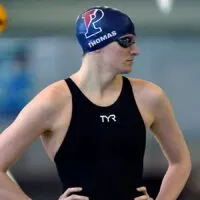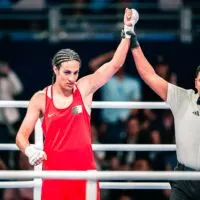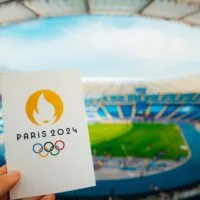Amidst the celebration and grandeur of the Paris 2024 Olympics, a different kind of story has emerged from the heart of the event. Gold medalist Thomas Ceccon, instead of basking in the glory of his victories, found himself seeking solace under the open sky, away from the very accommodations designed for world-class athletes. The Olympic Village, expected to be a sanctuary for top performers, has instead become a focal point of controversy and discontent.
Athletes from various disciplines have voiced their frustrations, painting a picture that contrasts sharply with the spirit of excellence the Games represent. Reports of discomfort, inadequate facilities, and even surprising culinary experiences have surfaced, challenging the image of the Olympic Village as a haven for champions.
What led a celebrated athlete like Ceccon to choose a park bench over his designated room? And what broader issues are simmering beneath the surface in this billion-dollar establishment? The answers unravel a complex narrative of expectations, reality, and the relentless pursuit of peak performance amidst less-than-ideal conditions.
The Incident
Italian gold medalist Thomas Ceccon was recently found sleeping in a park after expressing his dissatisfaction with the living conditions at the Paris 2024 Olympic Village. Ceccon, who had already secured a gold medal in the 100m backstroke and a bronze in the 4x100m freestyle relay, was spotted napping under a tree on a white towel. This photo was taken by Saudi rower Husein Alireza and posted on Instagram with the caption, “Rest today, conquer tomorrow”.
Ceccon had openly criticized the Olympic Village, describing the conditions as “subpar.” He specifically mentioned the lack of air conditioning, poor food quality, and the general difficulty in getting adequate rest due to the heat and noise. “There is no air conditioning in the village, it’s hot, the food is bad,” Ceccon stated, adding that the uncomfortable environment contributed to his fatigue and poor performance in the 200m backstroke final.
The Italian swimming federation (FIN) later clarified that the video of Ceccon napping was unrelated to his earlier complaints, emphasizing that it was just a daytime nap within the Olympic Village grounds. Alireza also defended the context of the footage, explaining that it is common for athletes to rest on the grass in the peaceful areas of the village, especially by the river.
This incident has highlighted broader concerns among athletes regarding the Olympic Village conditions, with several athletes echoing Ceccon’s sentiments. For instance, American tennis player Coco Gauff revealed that one of her teammates left the village due to cramped quarters, and Australian swimmer Ariarne Titmus mentioned that the village environment hindered optimal performance.
Athlete Complaints and Experiences
The living conditions at the Paris 2024 Olympic Village have been a significant point of contention among athletes. Numerous complaints have emerged, reflecting a wide array of issues that have impacted their performance and overall experience.
Cardboard Beds and Lack of Air Conditioning Many athletes have criticized the cardboard beds provided in the Olympic Village. While designed for sustainability and claimed to be sturdy, athletes like American gymnast Simone Biles have found them uncomfortable. The lack of air conditioning has exacerbated the discomfort, especially during the summer heatwave in Paris. Italian swimmer Thomas Ceccon specifically mentioned the heat and noise as factors that made it difficult for him to rest adequately, impacting his performance in the 200m backstroke final.
Food Quality and Availability Food quality has been another major issue. Athletes have reported that the meals are often lacking in taste and variety, with essential proteins like meat and eggs frequently running out. British swimmer Adam Peaty expressed his frustration over the sustainability narrative being imposed on athletes, stating that the food did not meet the standards expected for high-performance athletes. He noted instances of athletes finding worms in the fish served and the overall inadequacy of the catering services.
General Living Conditions Other athletes have shared similar grievances. Australian swimmer Ariarne Titmus, who won gold in the Women’s 400m freestyle, commented that the living conditions made it hard to perform at their best. Titmus mentioned that the environment was not conducive to high performance, a sentiment echoed by several other athletes. The cramped quarters and the overall layout of the village have also been points of contention, with American tennis player Coco Gauff revealing that one of her teammates left the village due to these issues.
Organizers’ Response In response to the backlash, Paris 2024 organizers have stated that they are in constant communication with National Olympic Committees to address these issues. They have made adjustments to food services and transportation to better meet athletes’ needs. However, despite these efforts, the initial shortcomings have left a lasting impact on many athletes’ experiences.
This widespread dissatisfaction highlights the gap between the expectations and the reality of the accommodations provided, underlining the importance of addressing these fundamental issues in future Olympic Games.
Official Responses
In response to the wave of complaints from athletes about the living conditions at the Paris 2024 Olympic Village, the organizing committee has taken several steps to address the issues raised.
Food and Catering Adjustments The organizers acknowledged the initial problems with the quality and quantity of food. They have since made adjustments, including increasing the supply of animal proteins such as meat and eggs to meet athletes’ dietary needs. Paris 2024 CEO Etienne Thobois stated that they reinforced the availability of these proteins to ensure that athletes have the necessary nutrition for peak performance. Additionally, efforts have been made to provide more variety and improve the overall dining experience.
Transportation Improvements Transportation was another significant area of concern, with athletes complaining about long commutes and inadequate bus services. The organizers have responded by adding more buses and improving the punctuality and efficiency of the transportation system. Thobois mentioned that they have taken measures to ensure that all competition sessions start on time and that transportation services operate smoothly.
Accommodation Enhancements Regarding accommodation, the Paris 2024 organizing committee has highlighted the use of customizable Airweave mattresses, designed to meet the specific comfort needs of athletes. These mattresses were previously used and approved during the Tokyo Games, offering a familiar level of comfort for many athletes.
General Feedback and Ongoing Adjustments The organizers have been in constant communication with National Olympic Committees to address any further concerns. They emphasized that athlete well-being is their priority and are committed to making necessary changes to ensure a positive experience. This includes ongoing adjustments to catering and transportation services as needed.
Positive Feedback Despite the complaints, some delegations, like the Australian Olympic Committee, have praised the organizers for their quick response to issues and overall high-quality accommodations. The Australian team, for instance, noted that their feedback was promptly addressed, leading to improvements in both food and transportation services.
These efforts demonstrate the organizers’ commitment to providing a conducive environment for athletes, even as they navigate the complexities and challenges of hosting the Olympics.
Broader Issues at the Olympic Village
The Paris 2024 Olympic Village has faced several broader issues beyond individual athlete complaints, reflecting systemic challenges in the facility’s design and operation.
Sustainability and Food Quality One of the significant challenges has been the organizers’ emphasis on sustainability, which some athletes feel has compromised the quality of their experience. The commitment to making 60% of meals meatless and one-third plant-based aimed to reduce the carbon footprint. However, this shift has led to dissatisfaction among athletes who rely on high-protein diets for their performance. British swimmer Adam Peaty highlighted concerns over the presence of worms in the fish served and the overall lack of adequate protein options, emphasizing the discrepancy between the athletes’ nutritional needs and the food provided.
Living Conditions and Infrastructure The Village’s eco-friendly design, which includes cardboard beds and buildings made from natural materials, aimed to create a sustainable environment. However, the lack of air conditioning and the discomfort caused by the cardboard beds have been major points of contention. The Australian Olympic Committee reported initial issues with transportation and food but acknowledged that these were promptly addressed by the organizers.
Repurposing and Legacy Despite these challenges, the Paris 2024 Athletes’ Village has been designed with a long-term vision. The organizers intend to transform the accommodation into housing and offices post-Games, aiming to create a lasting legacy for the local community. The Village, spanning areas such as Saint-Denis and Saint-Ouen-sur-Seine, will eventually house 6,000 residents and provide workspaces for another 6,000 people.
Climate Adaptation The Village has also been constructed to adapt to future climate conditions, incorporating green spaces and renewable energy sources like photovoltaic panels. The design includes features to mitigate climate change effects, such as vegetation and water in public areas. The broader issues at the Olympic Village have attracted considerable media attention and public scrutiny. Reports of food quality concerns, such as worms in fish, have fueled debates about the balance between sustainability and the athletes’ immediate needs. The media coverage has amplified athletes’ voices, prompting organizers to make necessary adjustments.
While the Paris 2024 Olympic Village aims to set a benchmark for sustainability and legacy, the immediate execution has highlighted significant areas for improvement. The organizers’ efforts to address these issues continue, balancing the athletes’ performance needs with broader environmental goals.
Social Media and Public Reaction
The conditions at the Paris 2024 Olympic Village have sparked significant reactions on social media and among the public, reflecting a mix of outrage, humor, and support.
Athlete Reactions on Social Media Several athletes have taken to social media to express their dissatisfaction with the accommodations and facilities. USA tennis star Coco Gauff shared a TikTok video showing the inadequate facilities, including shared bathrooms and cardboard beds, which led her team to move to a hotel for better conditions. Similarly, Australian swimmer Ariarne Titmus criticized the living conditions, stating that they made it difficult to perform at her best. Titmus’s sentiments were echoed by other athletes, such as water polo players Tilly Kearns and Gabi Palm, who described the beds as uncomfortable and the overall setup as detrimental to high performance.
Public and Media Response The public reaction has been a blend of support for the athletes and criticism of the organizers. Social media platforms have been flooded with comments and memes about the conditions, with many users expressing shock and disbelief at the reported issues. The hashtag #OlympicVillage has been trending, with numerous posts highlighting both the athletes’ complaints and humorous takes on the situation.
Positive Feedback Amidst Criticism Despite the negative feedback, some responses have been more positive. The Australian Olympic Committee (AOC) released a statement acknowledging early issues but praising the organizers for their quick responses and improvements. They highlighted the availability of familiar food options and the overall high-quality experience in the village after initial adjustments.
The broader public has also engaged with the situation through humor. Memes about the cardboard beds and the vegan food options have circulated widely, with users making light of the challenges faced by the athletes. This humorous approach has helped maintain a lighter tone amidst the more serious criticisms.
The social media and public reaction to the Paris 2024 Olympic Village conditions have underscored the importance of athlete well-being and the need for organizers to balance sustainability with comfort and performance requirements. The ongoing discussions and feedback highlight the global community’s engagement with the Olympic Games beyond the sporting events themselves.
Beyond the Podium: The Untold Olympic Experience
Despite the grandeur and celebration of the Paris 2024 Olympics, the issues within the Olympic Village highlight the critical importance of balancing sustainability with athlete well-being. The experiences shared by athletes like Thomas Ceccon, Coco Gauff, and Ariarne Titmus reveal that even the world’s top performers can struggle when basic comforts are compromised. The organizers’ efforts to address these concerns demonstrate a commitment to improvement, yet the initial shortcomings have left a mark on the event’s legacy.
As the Games continue, the stories emerging from the Olympic Village serve as a reminder of the human element behind every medal and record. The athletes’ resilience in the face of adversity not only showcases their physical prowess but also their ability to adapt and overcome unexpected challenges. This year’s Olympics have not only tested their athletic skills but also their endurance in less-than-ideal conditions, underscoring the need for future events to prioritize both performance and comfort.





